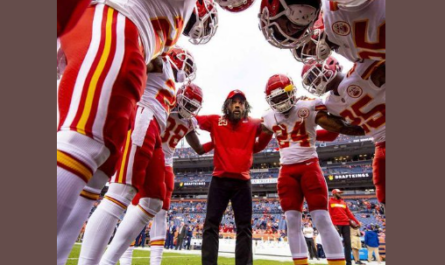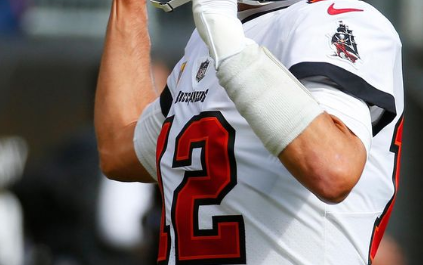Patrick Mahomes and the Power of Bouncing Back
[bg_collapse view=”button-orange” color=”#4a4949″ expand_text=”Show More” collapse_text=”Show Less” ]
Patrick Mahomes has become one of the NFL’s brightest stars as the quarterback of the Kansas City Chiefs. With his rocket arm and uncanny playmaking ability, Mahomes has dazzled fans with highlight-reel throws and clutch performances that have led the Chiefs to success. However, what often goes unnoticed is Mahomes’ mindset and approach, which he believes have been key to his rise. At the core of Mahomes’ mentality is an emphasis on overcoming failure – not just to avoid repeating mistakes, but to continuously learn and improve.
From an early age, Mahomes was taught the value of resilience by his major league baseball playing father Pat. As Pat recalled, “I told him from a young age, ‘You’re going to fail. It’s not about failing, it’s about how you respond.'” This instilled a growth mindset in Mahomes – the belief that abilities and skills can be developed through effort, rather than being fixed traits. For Mahomes, failures became opportunities rather than setbacks, chances to identify weaknesses and strengthen his game.
This mindset was tested during Mahomes’ college career at Texas Tech. As a starter for three seasons, Mahomes threw an interception in 20 of his 36 career games, learning tough lessons along the way. “In college, I had to learn how to bounce back from those failures and mistakes,” Mahomes reflected. “That’s something that has really helped me at this level.” By embracing failures and using them as learning experiences, Mahomes was building resilience – the ability to recover quickly from difficulties.
Resilience would prove invaluable as Mahomes entered the NFL. As a first-year starter for the Chiefs in 2018, Mahomes led the league with 50 touchdown passes on his way to MVP honors. However, he also threw 12 interceptions while facing immense pressure as the focal point of the high-powered Chiefs offense. After each mistake, Mahomes focused on analyzing his errors, rather than dwelling on the past. “I try to learn from those mistakes and not let it affect my confidence going into the next play,” he explained.
This ability to bounce back served Mahomes well in the playoffs. In the AFC Championship against the Patriots, Mahomes threw two costly interceptions, including a pick-six. But he rebounded to lead the Chiefs on three touchdown drives in the fourth quarter for a 37-31 overtime victory. As Mahomes put it, “It’s about having that short memory and moving on to the next play.” By overcoming failures so quickly, Mahomes was able to stay fully present and continue performing at an elite level under extreme pressure.
Mahomes’ penchant for learning from mistakes and bouncing back strongly has made him an inspirational leader. As Chiefs tight end Travis Kelce observed, “The way Pat attacks each day and looks to get better is so impressive. When he’s out there making plays after a mistake, it lifts our whole team.” By showing he can overcome failures and adversity, Mahomes sets a powerful example for his teammates to follow. No lead is safe with Mahomes, as he believes any deficit can be overcome through resilience and relentless effort.
This mentality was on full display during the 2020 season. Despite leading the Chiefs to a Super Bowl victory the previous year, Mahomes still faced doubts after a slow start in 2020. He threw multiple interceptions in three of Kansas City’s first six games, including three picks against the Raiders. However, Mahomes used these failures as fuel, dissecting film to refine his mechanics and decision-making. Over the second half of the season, Mahomes cut down on turnovers while raising his completion percentage, leading the Chiefs to a 14-2 record and another Super Bowl appearance.
Mahomes’ approach has clearly paid dividends on the field. But it also stems from his driven personality and competitive fire. As former teammate and friend Travis Kelce explained, “He hates losing more than he loves winning.” For Mahomes, overcoming failures satisfies this competitive streak while also serving as an opportunity to grow. It’s why he rarely makes the same mistake twice and improves each season. As Chiefs head coach Andy Reid observed, “He’s got the ability to learn quickly. He doesn’t like to repeat mistakes.”
More than stats or trophies, continual self-improvement seems to motivate Mahomes the most. He views overcoming failures as integral to this process. By facing mistakes head-on and using them to sharpen his skills, Mahomes strives to become a more well-rounded quarterback. It’s a mindset that has propelled his development from a raw athletic talent into a seasoned veteran still entering his prime. As long as Mahomes maintains this growth-focused approach, there may be no limit to how much better he can become.
For young athletes, Mahomes’ example provides valuable life lessons. Rather than fearing failure, he embraces it as an inevitable part of growth. By maintaining resilience, a short memory, and a focus on improvement, Mahomes has thrived under immense pressure. His willingness to be vulnerably human by making mistakes, yet strongly determined to bounce back, makes him an inspiration both on and off the field. In an era of instant gratification and fragile egos, Mahomes’ emphasis on overcoming failure through hard work and a positive mindset is a refreshing reminder of the power of perseverance. It explains not only his extraordinary success, but why he may remain at the top of his game for years to come.
[/bg_collapse]



